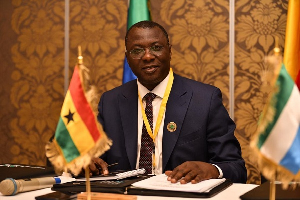 Minister of Finance, Dr. Mohammed Amin Adam
Minister of Finance, Dr. Mohammed Amin Adam
Following the country’s successful negotiation of crucial debt restructuring agreements with its official creditors and a substantial portion of its Eurobond holders, it is expected that these developments will invigorate efforts toward economic recovery.
Significantly, these agreements mark a pivotal moment in efforts to stabilise the economy and regain fiscal sustainability.
Building on the momentum of the Official Creditor Committee (OCC) deal, Ghana has now reached an Agreement in Principle (AIP) with two significant groups of its Eurobond holders. The International Committee, representing approximately 40 percent of bondholders, and the Regional Committee representing about 15 percent, have agreed to a comprehensive restructuring of Eurobonds.
The AIP with private creditors outlines two main options for bondholders. The first being a PAR option, capped at US$1.6billion, which maintains the principal amount but extends maturities and reduces interest rates. The second is a DISCO option, which involves a 37 percent reduction in principal but offers higher interest rates on the restructured bonds.
Both options include additional instruments such as a PDI (Past Due Interest) bond and a consent fee for participating bondholders.
This restructuring is expected to provide Ghana with approximately US$4.7billion in debt relief and US$4.4billion in cash flow relief during the IMF programme period. The agreement also includes important non-financial terms, such as a most-favoured creditor clause and enhanced transparency requirements for Ghana’s public debt reporting.
Per the statement, IMF staff have preliminarily confirmed that the AIP aligns with parameters of Ghana’s IMF programme, subject to official confirmation at the upcoming IMF Board meeting. The OCC co-chairs have also welcomed the progress, considering it a solid basis for assessing fair treatment among creditors.
Earlier this month, Ghana formalised a Memorandum of Understanding (MoU) with its Official Creditor Committee (OCC), co-chaired by China and France. This agreement, building on terms initially agreed upon in January, provides substantial debt service relief throughout Ghana’s three-year US$3billion Post-COVID-19 Programme for Economic Growth (PC-PEG), supported by the International Monetary Fund (IMF).
The OCC deal is expected to create vital fiscal space, allowing Ghana to redirect resources toward critical areas such as infrastructure, healthcare and education. This agreement is seen as a crucial step in Ghana’s economic recovery, paving the way for IMF Executive Board approval for the second review of the country’s programme and releasing the next US$360million tranche of funding.
Impact of these Agreements
The combined impact of these agreements is expected to be significant for Ghana’s economy and its standing in international financial markets. In the short-term, investors in Ghana’s Eurobonds will face losses either through reduced principal or lower interest rates and extended maturities. This could lead to some market volatility and potentially affect sentiment toward other frontier markets.
However, the structured approach to debt restructuring – coupled with the involvement of international institutions like the IMF – is likely to improve market sentiment in the medium- to long-term. The deals are seen as necessary steps to avoid worse outcomes such as a disorderly default, and could lead to cautious optimism among investors.
The agreements are also expected to have broader implications for emerging markets. They could set a precedent for how other countries in similar situations approach debt restructuring, potentially influencing investor expectations and strategies in these markets.
Rebuilding Trust
Ghana’s commitment to transparency and fair treatment of creditors, as evidenced by the terms of these agreements, could help rebuild trust with international investors over time. The regular publication of debt information, as stipulated in the AIP, is a positive step toward enhancing Ghana’s credibility in global financial markets.
As Ghana moves forward with implementing these agreements, focus will shift to the execution of its economic reform programme. The fiscal space created by these debt restructuring deals will expectedly allow government to invest in critical sectors and stimulate economic growth.
A formal launch of the consent solicitation for Eurobond restructuring is anticipated in coming weeks, subject to agreement on definitive documentation. Government will seek required approvals and support from the broader bondholder community to complete this crucial transaction.